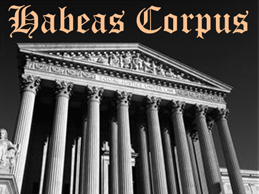Why You Required a Lawyer for Your Habeas Corpus Instance
Why You Required a Lawyer for Your Habeas Corpus Instance
Blog Article
Understanding the Function of a Post-Conviction Lawyer in Seeking Justice After a Criminal Conviction
In the complex landscape of post-conviction lawful process, the function of a post-conviction legal representative is crucial in browsing the path to justice after a criminal conviction. Past the boundaries of a trial, these attorneys participate in a multifaceted approach focused on revealing brand-new evidence, tough lawful errors, and advocating for their customers' legal rights. The ins and outs of post-conviction work call for a mix of legal acumen, investigatory abilities, and critical thinking to untangle the complexities of a case and seek opportunities that might have been overlooked or underexplored. As the search of justice expands past the confines of preliminary process, the duty of a post-conviction legal representative becomes a beacon of wish for those looking for to correct injustices and redeem their rights within the legal system.
Post-Conviction Legal representative's Investigatory Work
Post-conviction legal representatives participate in careful investigative job to discover new proof, procedural mistakes, or transgression that might possibly cause reversing a conviction. This investigatory phase is crucial in the post-conviction procedure as it aims to recognize any type of neglected information or legal bad moves that might have impacted the end result of the initial test. Post-conviction attorneys look into instance data, witness testimonies, and legal documents with a fine-tooth comb, browsing for any inconsistencies or irregularities that might be premises for charm.
Via extensive investigation, post-conviction attorneys intend to clarify possible injustices that may have taken place during the initial test. They may carry out interviews, talk to specialists, and review forensic evidence to construct a compelling situation for their customers. By scrutinizing every element of the lawful proceedings, post-conviction lawyers function tirelessly to discover any kind of factors that may have affected the judgment. Ultimately, their investigative job plays a pivotal function in the quest of justice and the possible reversal of wrongful convictions.
Crafting Appeals and Petitions
In the quest of justice after a sentence, experienced lawyers carefully craft charms and requests to existing engaging disagreements for the reconsideration of legal decisions. Crafting charms and requests needs a deep understanding of the legal system, attention to detail, and tactical thinking. Post-conviction lawyers analyze trial documents, recognize possible mistakes or infractions of legal rights, and establish legal arguments to challenge the sentence or sentence.
When crafting an allure, legal representatives concentrate on highlighting lawful errors that may have affected the end result of the instance. They look into situation legislation, statutes, and legal criteria to sustain their disagreements. Requests, on the other hand, may entail offering brand-new evidence that was not available throughout the test or demonstrating changes in the law that necessitate a review of the sentence.
In addition, post-conviction attorneys need to comply with stringent procedural rules and target dates when submitting charms and petitions. They have to provide their arguments plainly and persuasively to encourage the court to approve alleviation to their customers. With precise crafting of charms and petitions, post-conviction lawyers make every effort to safeguard justice for individuals that have actually been wrongfully convicted or unjustly punished.

Going After Post-Conviction Alleviation
Post-conviction alleviation includes a range of lawful mechanisms made to test the validity of a sentence or sentence. Post-conviction attorneys play an essential duty in navigating these intricate treatments, ensuring that all lawful alternatives are explored to remedy injustices that may have taken place throughout the trial or sentencing phase.
One common type of post-conviction alleviation is submitting an application for post-conviction alleviation, commonly based on claims of ineffective aid of counsel, prosecutorial misconduct, freshly uncovered evidence, or constitutional infractions. These applications need an extensive evaluation of the trial document, lawful research study, and influential advocacy to persuade the court to provide relief. Experienced post-conviction attorneys have the skills and understanding essential to identify feasible lawful claims, carry out examinations, and existing compelling arguments to protect alleviation for their clients. By vigilantly going after post-conviction alleviation, these legal professionals make every effort to correct miscarriages of justice and maintain the concepts of justness and due process in the criminal justice system (Attorney).
Making Use Of Forensic Proof
When testing a conviction or sentence, the tactical use of forensic evidence can be a powerful tool in post-conviction lawful process. Forensic proof incorporates a large range of scientific techniques used to investigate crimes and develop realities in court. Post-conviction legal representatives can take advantage of forensic evidence to challenge the validity of sentences by providing new scientific searchings for that were not readily available during the original test.

Engaging in Sentence Adjustments
Post-conviction attorneys may check out the possibility of sentence adjustments as a legal opportunity to deal with disproportionate or unjust sentences handed down in criminal cases. Sentence modifications entail looking for adjustments to the regards to an accused's sentence after a conviction has happened. These modifications can consist of lowering the size of a sentence, changing the type of punishment imposed, or checking out different sentencing alternatives.
Post-conviction attorneys can pursue sentence modifications through various legal systems, such as submitting movements for sentence reduction, appealing blog for thoughtful launch, or working out plea bargains for minimized sentences. They need to very carefully evaluate the circumstances of the instance, examine the legal premises for seeking a modification, and existing compelling debates to the court supporting the need for a modified sentence.
Participating in sentence modifications needs an extensive understanding of criminal law, punishing guidelines, and the details procedures entailed in seeking post-conviction alleviation. Post-conviction attorneys play an important duty in promoting for reasonable and just end results by difficult sentences that are unduly rough or do not straighten with the concepts of justice.
Verdict
Finally, the role of a post-conviction attorney is essential in looking for justice after a criminal conviction. With investigative job, crafting allures and petitions, seeking post-conviction alleviation, utilizing forensic evidence, and participating in sentence adjustments, these attorneys play a crucial function in advocating for their customers and ensuring that their rights are promoted within the criminal justice system. Their dedication and knowledge are vital in browsing the intricacies of post-conviction process and attaining a fair end result for individuals encountering criminal convictions.
Report this page